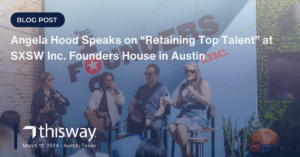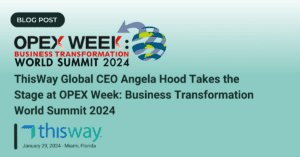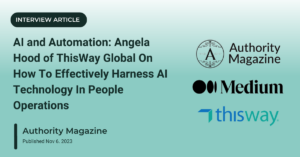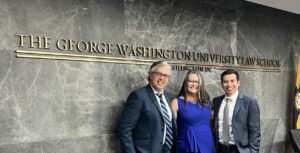It may sound a bit cheeky to say that but it’s true; the first step in a startup is the part where you actually take the leap to trust yourself, your idea and just start. In some ways I started ThisWay in 1991 so ‘starting’ may look a bit different than you think.
When I see problems I want to know why the problem exists and why no one has solved it. I’ve been like this for as long as I can remember and I think it’s one thing that most entrepreneurs have in common. We are curious, sometimes to a fault. We want things fixed and if it’s not being fixed by others, we contemplate fixing it ourselves.
As I was graduating from Texas A&M University, we were told to not expect job offers and we needed to sort out a Plan B because the economy was bleak, especially in construction. But I was completely self-supporting so I had to have a job. Thanks to my mentor and now friend, Leslie Feigenbaum, my idea of a Career Fair to encourage employers to hire us rather than students from competitor schools was supported. I along with 26 of my graduating classmates, received jobs that likely would not have been offered without this effort. It was a small victory but this Career Fair has grown and continued for nearly 25 years now and hundreds, if not thousands, have been hired through it’s efforts.
Fast forward to the credit and housing crash in 2008. The company I started in 1999 had $22 million worth of contracts retracted over the course of just 8 weeks. Six project owners, including a successful hotel franchiser, had lost their funding because banks had pulled financing. When they lost their credit, we lost our pipeline of work for the upcoming 18 months. It was brutal. Our company and family had to go into survival mode. I had no option but to make redundant/lay off our workforce, including my best friend. I’ve had some pretty tough moments but that day was extraordinarily tough, on many levels.
The next five years were rough in many different ways, not just for our company and family. The recession was deep and has left a lasting mark, worldwide. The only positive was that with less work, I had more time to spend with my children and time to learn everything I could about start-up ecosystems, technology and what is required to scale a business. The credit crunch made me change the way I looked at lifestyle businesses. I never want to have one again.
In 2013 we were offered the opportunity to move to England. It didn’t take much research to discover ideaSpace – University of Cambridge and the Cambridge idea of open innovation. I’d been working on a tech concept with others and hoped to have the opportunity to continue this work once in Cambridge. Within 60 days we had moved to England, I had met another important mentor, Stew McTavish, the Managing Director of ideaSpace, and I was looking to solve some significant problems with our idea. I was truly passionate about this philanthropic tech idea but passion isn’t enough. There were market timing and point of sale issues that we couldn’t work around so it had to be shelved before it ever got started.
At the same time I was watching my teenage son struggle to learn from outdated teaching materials so I contemplated the idea of building a mobile app that would help students learn physics, chemistry, etc through the use of viral videos. It was pretty cool so I decided to conduct some market testing and see what the would-be customers thought.
Over the course of several months I tested the concept with close to 2000 students from all walks of life, including the top schools in Cambridge. Over 70% of them told us that while they liked the app, what they really needed was help getting jobs. The same sentiment was shared amongst the students, no matter the socio-economic background.
Their stories were shocking in many ways. A significant number spoke about taking student loans out to attend university, not because they wanted to go to school, but because they couldn’t find a job. The thought of taking on student debt because you couldn’t find a job was truly stunning.
So in November of 2013, after having concluded the market research, I decided to give myself 2 months to research the youth unemployment problem and decide what I would do next. By December the research showed that governments were trying to fix the problem but the market place was just exploiting it. It made me angry. People must work to support themselves and to provide a sustainable economy. If you are willing and able to work then you should be able to find work…it’s as simple as that.
When faced with the realities that I was considering tackling one of the biggest problems in the world, as a non-technical founder, with a very small budget, I reflected back to what a friend, former business partner and now Managing Director of TechStars, Amos Schwartzfarb said to me in 2010. He told me that if I’m not afraid to build neighborhoods then I shouldn’t be afraid to build a tech platform. He couldn’t have been more correct but it took me until 2015 to believe him.
Amos introduced me to someone else, who is now also a friend that redefines the position, CTO, Russell Foltz-Smith. Russ has a gift in explaining difficult things in a way that makes them sound simple. He gave me enough confidence and understanding that I felt I could sort out the rest. He helped me get my head around lifecycles, big data and how to think through the problems in a way to see how technology can enable solutions, rather than be the solution. It’s an important difference.
I had also received some meaningful advice from a Central Texas Angel Network Board Member, by the name of John Paulos. There were many but two bits have proven essential. First, if you want to truly scale a business, you can’t build it around a person because the business needs to exist no matter what happens to the people in it. I can think of no better proof of this requirement than Apple’s loss of Steve Jobs. For this reason, everyone in our company is replaceable, including me.
The second piece that has proven important is understanding that your greatest competition may be that your customer decides to do nothing. The may not use your competition, or they may leave the competition, but either way, they may not see or care that you are trying to solve their problem.
And more recently, consultation by tech leaders such as Alex Osterwalder helped me to fine tune something very critical. We have the ability to be really disruptive but people want jobs, businesses want employees, they don’t want to be ‘disrupted’. This made me realize that ‘just because you could, doesn’t mean you should‘. We have the ability to do lots of techy things but it would be arrogant to do them just because we could. We need to focus on the things that we should do. In fact, the things that our competitors should have been doing, all along. It’s an important nuance that will keep us from being too disruptive.
So now I had more than 25 years of experience, both good and bad, under my belt, as well as great mentors.
My husband of 22 years gave me his complete support.
Then it was down to the last question that I always ask myself before making big decisions, “What would the 80 year-old me say I should do? Would she be disappointed that I didn’t try?” The answer to this question was “Yes, she would be appalled to know I didn’t try.” Because in truth, it didn’t matter if I had never started a tech company before.
When I started the Career Fair, I had never started one before.
When I started my first company, I grew it to a multi-million dollar company and I had never started one before.
And when I decided to start ThisWay, I had never started a tech company before.
In 1991 I started the Career Fair by identifying and researching a problem. Then I put myself next to top minds that were willing to mentor me. Then I checked my gut and made sure I had the passion and energy required to go the distance, even when things aren’t going well. Finally, I made sure I had the support of those closest to me and then I went for it.
On 8th of January, 2014 I took these exact same steps and picked up where I left off, so many years ago.
It’s now 23rd of August, 2015 and I have never been so happy to have started something. The support of our staff, our partners, and international governments has been nothing short of amazing.
Over the course of the coming months, I will shed some light on how I, a non-technical founder was able to start a company on a tight budget. Because if you want to start, and aren’t sure how, I want to help you. Just like so many others have helped me.
One last note… I want to thank Amos, Russ, John, Alex, and last but not least, my husband, Justin. I sincerely appreciate the guidance and support you have given me, whenever I have needed it.









